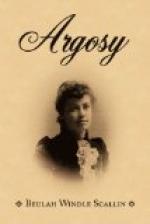“Harry will make a better master to succeed you than I should have made, father,” said Hubert, as they were slowly pacing home from the parsonage, arm-in-arm, one dull November day, some little time after the meet of the hounds, as recorded. It was surprising how often Captain Monk would now encounter his son abroad, as if by accident, and give him his arm home.
“What d’ye mean?” wrathfully responded the Captain, who never liked to hear his own children disparaged, by themselves or by anyone else.
Hubert laughed a little. “Harry will look after things better than I ever should. I was always given to laziness. Don’t you remember, father, when a little boy in the West Indies, you used to tell me I was good for nothing but to bask in the heat?”
“I remember one thing, Hubert; and, strange to say, have remembered it only lately. Things lie dormant in the memory for years, and then crop up again. Upon getting home from one of my long voyages, your mother greeted me with the news that your heart was weak; the doctor had told her so. I gave the fellow a trimming for putting so ridiculous a notion into her head—and it passed clean out of mine. I suppose he was right, though.”
“Little doubt of that, father. I wonder I have lived so long.”
“Nonsense!” exploded the Captain; “you may live on yet for years. I don’t know that I did not act foolishly in sending post-haste for Harry Carradyne.”
Hubert smiled a sad smile. “You have done quite right, father; right in all ways; be sure of that. Harry is one of the truest and best fellows that ever lived: he will be a comfort to you when I am gone, and the best of all successors later. Just—a—moment—father!”
“Why, what’s the matter?” cried Captain Monk—for his son had suddenly halted and stood with a rapidly-paling face and shortened breath, pressing his hands to his side. “Here, lean on me, lad; lean on me.”
It was a sudden faintness. Nothing very much, and it passed off in a minute or two. Hubert made a brave attempt at smiling, and resumed his way. But Captain Monk did not like it at all; he knew all these things were but the beginning of the end. And that end, though not with actual irreverence, he was resenting bitterly in his heart.
“Who’s that coming out?” he asked, crossly, alluding to some figure descending the steps of his house—for his sight was not what it used to be.
“It is Mr. Hamlyn,” said Hubert.
“Oh—Hamlyn! He seems to be always coming in. I don’t like that man somehow, Hubert. Wonder what he’s lagging in the neighbourhood for?”
Hubert Monk had an idea that he could have told. But he did not want to draw down an explosion on his own head. Mr. Hamlyn came to meet them with friendly smiles and hand-shakes. Hubert liked him; liked him very much.
Not only had Mr. Hamlyn prolonged his stay beyond the “day or two” he had originally come for, but he evinced no intention of leaving. When Mr. Peveril and his wife departed for the south, he made a proposal to remain at Peacock’s Range for a time as their tenant. And when the astonished couple asked his reasons, he answered that he should like to get a few runs with the hounds.




